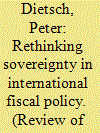| Srl | Item |
| 1 |
ID:
174082


|
|
|
|
|
| Summary/Abstract |
The delegation of authority to private companies in the security domain has certain advantages for states. It optimizes security, lowers costs and eschews accountability. The aim of this article is to examine the implications of the increasing role of private security companies within, at and beyond the borders of state sovereignty. This article argues that the growing power of private security companies in the prevention and the regulation of unauthorized flows of people and goods produces contradictory tendencies for state sovereignty. As private security companies fulfil roles that were previously under the exclusive authority of state actors, states have lost their exclusivity with respect to their coercive and performative roles. Yet, the privatization of security is the result of the calculated decisions of state actors to increase their coercive power against unauthorized border crossers. Even though states’ sovereign exclusivity is being weakened with the privatization of the security domain, both state and private actors work towards strengthening states’ sovereign authority by excluding and deterring unauthorized movements of people and goods.
|
|
|
|
|
|
|
|
|
|
|
|
|
|
|
|
| 2 |
ID:
108480


|
|
|
|
|
| Publication |
2011.
|
| Summary/Abstract |
The power to raise taxes is a sine qua non for the functioning of the modern state. Governments frequently defend the independence of their fiscal policy as a matter of sovereignty. This article challenges this defence by demonstrating that it relies on an antiquated conception of sovereignty. Instead of the Westphalian sovereignty centred on non-intervention that has long dominated relations between states, today's fiscal interdependence calls for a conception of sovereignty that assigns duties as well as rights to states. While such a circumscribed conception of sovereignty has emerged in other areas of international law in recent years, it has yet to be extended to fiscal questions. Here, these duties arguably include obligations of transparency, of respect for the fiscal choices of other countries, and of distributive justice. The resulting conception of sovereignty is one that emphasises its instrumental as well as its conditional character. Neither state sovereignty nor self-determination is an end in itself, but a means to promoting individual well-being. It is conditional in the sense that if states do not live up to their fiscal obligations towards other states, their claims to autonomy are void.
|
|
|
|
|
|
|
|
|
|
|
|
|
|
|
|